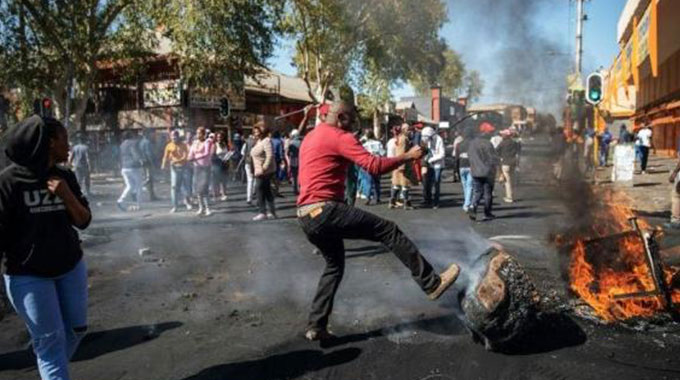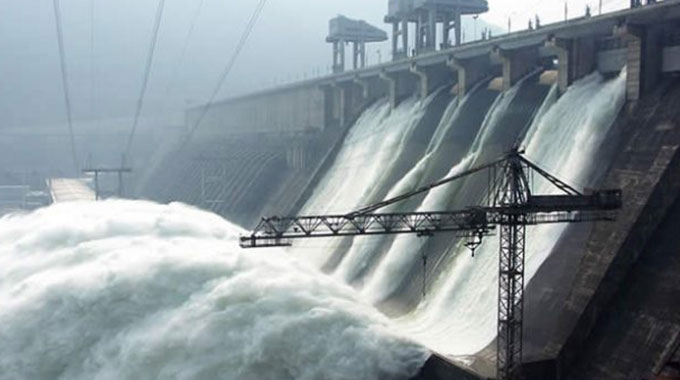Scapegoating African migrants fuels SA tensions

Cuthbert Mavheko
The wave of xenophobic violence, which swept across parts of South Africa like a ferocious veld fire recently, had all the hallmarks of a script from a Hollywood horror movie.
According to some conservative estimates, at least 10 people lost their lives and dozens were injured when black migrant workers from Zambia, Nigeria, Mozambique, Zimbabwe and other African countries were attacked by marauding groups of machete-wielding xenophobic South African hoodlums.
The heart-rending reality is that some of the victims had their homes destroyed while others had their business premises torched.
It is no hidden secret that such barbaric xenophobic attacks, now dubbed “Afro-phobia” have been perpetrated against black foreigners in South Africa since time immemorial.
In 2008, 60 foreigners were butchered and more than 50 000 were forcibly removed from their homes as violence flared across the Rainbow Nation.
Then in 2015 Zulu king, Goodwill Zwelithini, issued an inflammatory statement ordering all foreigners to pack their bags and leave South Africa. This ignited a firestorm of xenophobic violence which, sad to say, left seven people dead, dozens nursing serious wounds and property worth thousands of rands destroyed.
The situation that prevails in South Africa today is not only volatile; it is a cause for great concern as it is setting blacks against blacks. This is a glaring negation of the spirit of African unity and brotherhood, which was espoused by African leaders at the founding of the Organisation of African Unity, now the African Union, in 1963.
One pertinent observation I have made is that most South Africans, out of sheer ignorance, negate the role played by African countries in emancipating them from the yoke of apartheid rule. This, in my humble view, is perhaps the reason why ordinary South Africans regard black foreigners in South Africa as intruders and economic opportunists, who are reaping where they did not sow.
What they seem not to know is that independent African countries like Zimbabwe, Zambia and Nigeria, among others, played critical roles to dislodge apartheid rule in South Africa. Mozambique, for instance, lost its founding president, Samora Machel, when agents of the apartheid regime brought down his plane because he supported the struggle against minority rule in South Africa.
Indeed, it boggles the mind to note that while black foreigners in South Africa have become targets for xenophobic attacks, white foreigners are exempt from such attacks and continue to conduct their businesses peacefully.
Speaking at a recent Press Conference in South Africa, Julius Malema, the charismatic and firebrand leader of the Economic Freedom Fighters (EFF) questioned why white foreigners in South Africa are not affected by the violence.
Personally, I think one would not be totally incorrect to conjecture that white foreigners in South Africa may actually be instigating the violent clashes for personal gain. That is an issue to be discussed in another article.
As the smoldering ashes of the “Afro-phobic” upheavals slowly ebb, fear, unease and uncertainty hang over the black migrant community in South Africa like an ominous cloud, not knowing when the barbaric attacks will erupt again.
The arrests of dozens of xenophobic hoodlums linked to the violence do not seem to send any tangible assurance whatsoever that the Rainbow Nation will exorcise the ghost of “Afro-phobia”, once and for all, and the country returns to normalcy again anytime soon.
The million-dollar question is this: What is the real cause of the recurring xenophobic attacks, which have made South Africa an unsafe and very dangerous place for black foreign migrants?
It is the humble submission of the author of this instalment that black South Africans should desist from making African migrants scapegoats for the economic ills that dog their country. They should, instead, concentrate on identifying the real cause of the economic challenges in order to find a lasting solution.
When one has a carbuncle, it is important to extricate the puss. But what is of greater importance, however, is to establish what caused the infection in the first place.
Blaming black foreigners for the economic challenges faced by millions of black South Africans is not a solution. If anything, this “scapegoating” only fuels tensions between locals and foreigners, culminating in a perpetuation of violent clashes.
South Africans need to awaken to the unpalatable reality that the major cause of strife in South Africa is the skewed pattern in the distribution of resources such as land.
It is worth noting that under apartheid, 73 percent of land in South Africa was in so-called “white areas” as thousands of indigenous blacks had been forcibly removed from all fertile land and dumped in arid pieces of land with erratic rain.
Sadly though, over 20 years after the winds of political metamorphosis swept apartheid rule into oblivion, legions of black South Africans continue to wallow in increasing poverty while most whites in the country are leading lavish lifestyles.
At the risk of inviting the ire of those who deified South Africa’s first democratically elected president, Nelson Mandela, I must however point out that I think he is solely to blame for the economic challenges faced by the generality of black South Africans today.
Nelson Mandela was deeply respected in his homeland, and almost hero-worshipped, for his definitive role in ending white minority rule and establishing democracy in South Africa. However, the bitter truth that black South Africans should swallow in huge gulps is that ‘Madiba’ left them economically marginalised when he exited the political arena in 1999.
One of Mandela’s major shortcomings when he was elected as the first black president of South Africa, on May 10, 1994 was his over-eagerness to placate the whites during the transition to non-racial democracy in South Africa.
The honest truth is that Mandela was more interested in keeping power brokers happy, albeit with a handful of black faces in the group, than in economically empowering the vast majority of poverty-stressed black South Africans.
In a wide-ranging interview with Nadira Naipaul in the London Evening Standard in 2010, Winn ie Madikizela-Mandela had no kind words for her ex-husband.
“Mandela let us down. He agreed to a bad deal for the blacks. Economically, we are still on the outside,” she was quoted as saying.
Madikizela-Mandela’s sentiments were not without justification. When we meticulously examine Mandela’s achievements within the framework of his people’s struggle against apartheid, it is striking to note that they do not go beyond the attainment of political independence for blacks in South Africa. However, political independence without economic independence is inconsequential.
If indeed the truth be told without fear or favour, when Mandela retired from politics at the expiry of his first term as president, he left whites in South Africa better economically than the blacks they had oppressed for centuries.
Today, almost 85 percent of South Africa’s wealth is in the hands of white foreigners, whose population is a mere 4, 6 million, while the 41 million black South Africans control an infinitesimal 15 percent of the economy.
This is the situation in South Africa today, which Nelson Mandela failed to address during his tenure of office as President of the Republic of South Africa.
*Cuthbert Mavheko is a freelance journalist living in Bulawayo. He can be contacted via mobile 0773 963 448 or email [email protected]








Comments